How to replace a line trimmer fuel line video
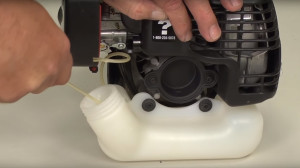

Leaking fuel might mean that the line trimmer's fuel line has cracked. This video shows how to replace it. For repair guides for other line trimmer troubleshooting, see our grass line trimmer repair help.
Over time, the fuel line on a gas line trimmer become hard and brittle, and eventually the line will crack and leak.
Equipment and tools you need
You need both fuel lines to complete the repair. Most manufacturers offer a kit that includes both fuel lines. If your model does not have a kit available, make sure to order both the small and large fuel line. If the filter is rusted or broken, it should be replaced. You can order these parts online by visiting SearsPartsDirect.com or by calling 1-888-873-3829. Write down the exact model number from your trimmer and include dashes, periods and other characters. You’ll need this complete number to ensure you order the correct parts.
The tools you need to replace the repair lines are a pair of safety glasses, a pair of scissors and a pair of hemostat forceps or a pair of long needle-nose pliers. The repair can been done with needle-nose pliers, but it’s easier to fit the hemostat forceps into tight areas.
Besides the tools, you need some shop rags or paper towels, a small gas can to drain the remaining fuel, a funnel, a pen or pencil and some paper. You may also need a lubricant such as WD-40. Wear nitrile gloves if you have any concern about your skin coming into contact with fuel.
Before you begin
Work in a well-ventilated area, away from open flames and any other kind of ignition source.
Drain the fuel
Drain any fuel left in the fuel tank into an approved container. Cap the gas can and set it aside so it doesn’t accidentally spill. Old fuel is considered hazardous household waste. Be sure to dispose of all fuel in accordance with applicable law. Most cities or counties have some type of hazardous waste recycling facilities.
Remove the fuel lines
Draw a diagram of where the fuel lines connect (or take a digital photo). Be sure to note on the drawing which is the small and which is the large line.
Remove the fuel line from the carburetor with the hemostat forceps or long needle-nosed pliers. Grasp the old fuel line inside of the tank and pull it into the tank and out the filler opening. If the fuel line came apart while pulling it out, it’s a good idea to tip the trimmer and shake it to get all of the pieces out.
After you remove all of the parts of the fuel line, find the fuel filter and plastic connector, if so equipped, and set them aside. You can throw the rest of the old fuel line away.
Install the small fuel line
The new lines are bigger than the holes in the tank, so the line can seal against the tank. To install the line, use the scissors and cut the end of the small line at an angle. Then push the cut end of the line into the small hole in the tank.
Once you have the line in the hole, use hemostat forceps or needle-nosed pliers to reach into the tank and grab the fuel line. Then pull the line through the fuel tank filler opening. You will need to pull out about 4 inches. If it's difficult to pull the line, you can spray a little WD-40 on the fuel line, so the fuel line pulls through easier.
Now cut the end of the line square and attach the filter. Push the filter into the tank. You can now attach the small line to the correct port on the carburetor. If the line is too long, cut it to the proper length with scissors first. Refer to the drawing you made earlier to ensure that you are connecting the line to the correct port. If you used any WD-40 on the fuel line, wipe it off with a paper towel before connecting it.
Install the large fuel line
Cut the large fuel line at an angle similar to the one you cut on the smaller line. Then push it into the large hole in the tank. Now grab it with a pair of long needle-nosed pliers or forceps. Pull enough line out of the tank fill opening so you can cut the line square.
If your model is equipped with a connector, hold the fuel line and push the connector onto the fuel line. Then pull the fuel line out of the top of the tank. Pull it until the connector is against the hole in the top of the tank. Once it is in position, cut the larger line to length and connect it to the carburetor.
Fill with fuel
Refuel the fuel tank with fresh fuel and check for leaks. If there are no leaks, the repair is complete.
Symptoms for gas line trimmers
Choose a symptom to see related grass line trimmer repairs.
Main causes: stale fuel, clogged fuel filter, faulty spark plug, clogged air filter, cracked fuel lines, clogged carbure…
Main causes: stale fuel, cracked fuel lines, dirty carburetor, bad spark plug, worn piston rings…
Main causes: cracked fuel lines, bad carburetor seals, leaky fuel tank cap, damaged fuel tank…
Repair guides for gas line trimmers
These step-by-step repair guides will help you safely fix what’s broken on your grass line trimmer.
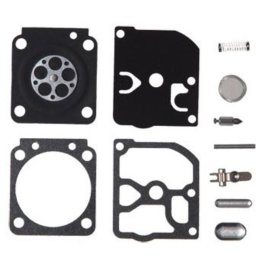
How to rebuild a line trimmer carburetor
If the line trimmer engine won't start even though there's fuel in the tank, the carburetor could be the problem. Follow…
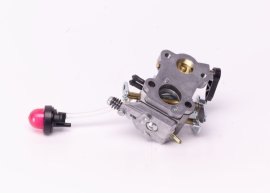
How to replace a line trimmer carburetor
If the line trimmer won't start even though there's fuel in the tank, the carburetor could be the problem. Follow these …

How to replace a line trimmer fuel line
The fuel line on a grass line trimmer deteriorates with time and eventually can split or crack. You can replace it yours…
Articles and videos for gas line trimmers
Use the advice and tips in these articles and videos to get the most out of your grass line trimmer.

Learn about all the convenient features on our Sears PartsDirect website that make your parts purchases easier.…
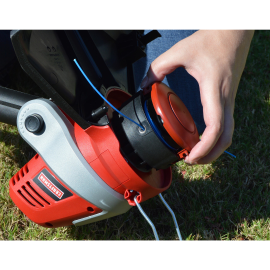
Follow these tips to prevent the cutting line on your grass line trimmer from breaking or feeding out too much or too li…
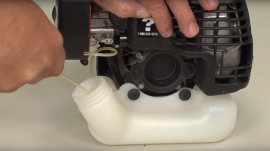
Follow the steps in this video to replace a leaking fuel line in a line trimmer.…